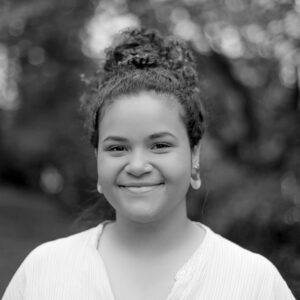National Survey: Black Women Worry Most About Children’s Education, Cite Lack of Educational Opportunities as Key Barrier to Economic Success
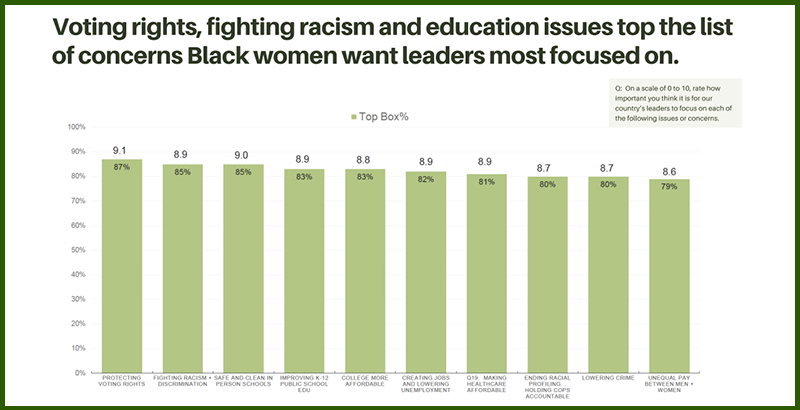
Get stories like this delivered straight to your inbox. Sign up for The 74 Newsletter
Safe, high quality in-person schools and access to higher education are top concerns for Black women – nearly as important as protecting voting rights and fighting racism, a new national survey has found.
Conducted by brilliant corners Research & Strategies, “Our Power, Our Legacy,” a June survey of 733 randomly selected Black women over the age of 18, was commissioned by The Highland Project to identify what priorities Black women identify as critical for future economic success after the devastating impact COVID-19 has had on Black communities.
“I want to turn and ask Black mothers, what do they need, and how can we better engage them more authentically in co-architecting solutions?” said Gabrielle Wyatt, who founded the Highland Project in 2020. About 89 percent of Black mothers surveyed say reaching educational goals is a key measure of success; while 85 percent say improving K-12 education is the top priority.
The report’s sample is geographically representative, with 27 percent of respondents having children under 18; 32 percent holding a higher education degree; and 38 percent married or partnered.
The findings will inform programming for The Highland Project’s first cohort of Black women leaders and advocacy plans for their local partners, including the education-focused Mind Trust in Indianapolis. Wyatt, Newark Schools’ former chief of strategy, created the nonprofit Highland Project as a coalition of Black women leaders aimed at closing the racial wealth gap via systems-level change.
Wyatt told The 74 that The Highland Project’s mission was born out of a belief that wealth provides opportunity — to things like home ownership and rainy day funds — yet economic solutions alone cannot solve the racial wealth gap.
“I think about Maslow’s hierarchy of needs — our lives and our bodies to be protected and need to be thriving. We need access to incredible health care,” said Wyatt. “We need access to great and nutritious foods. We need access to a community policing model… We also need access to great and incredible schools. When we say wealth, we need to be thinking about pulling multiple policy levers in order to get there.”
Here are three of the survey’s key findings and their implications for education policy:
1. Black women worry about children’s education more than anything else
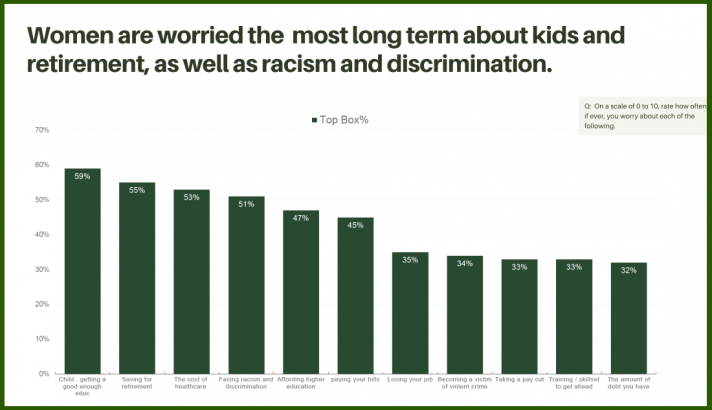
Fifty-nine percent of Black women say the issue most frequently on their mind — more concerning than retirement savings, healthcare costs, and losing their job — is whether their child or the children around them are “getting a good enough education.”
Quality education for the younger generation was the most frequently cited worry among all income levels.
The ability to afford higher education is a top concern for 47 percent, as well. College access and affordability is of greater concern for single Black women across age groups — 55 percent fear that they won’t be able to afford higher education for themselves or a family member.
Black women also hold disproportionately high levels of student debt as compared to any other demographic group. One year after graduating from 4-year institutions, Black women owe an average of $8,000 more than their white peers, likely due to compounding factors: generational wealth and a family’s ability to contribute to college costs, access to employment and wage gaps.
“What we have seen and what we have heard, as a culture, is that college is supposed to be the thing that closes the wealth gap for us, with our white peers, and what we’re seeing now is the opposite happening,” Wyatt said. “We’re in an urgent state of affairs in terms of addressing the student debt crisis, and continuing to kick the can on this, via the extension of loan payment relief, isn’t going to get us there.”
The report recommends eliminating student debt, calling it a “crippling barrier to wealth building.”
2. Lack of educational opportunities is a top barrier to economic success for Black women
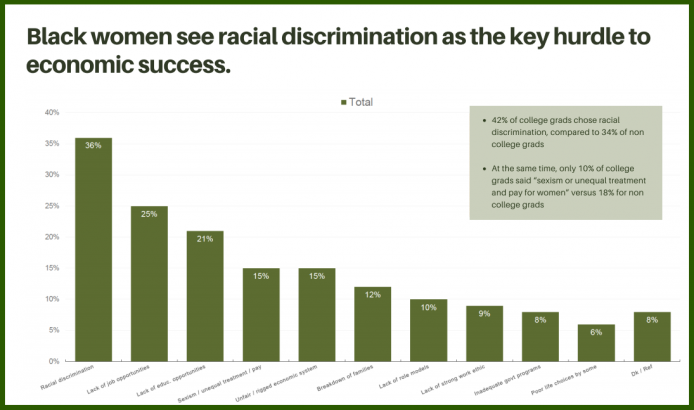
About 21 percent of Black women cite lack of educational opportunities as a key hurdle to economic success, and more than a quarter of Black women with college degrees believe so. Racial discrimination and lack of job opportunities were the other most frequently chosen hurdles.
The barriers align with the reports’ central finding of what priorities Black women want leaders to focus on: voting rights, racial discrimination, and access to quality education.
Wyatt told The 74 that the lack of diversity in educational leadership may be part of why Black women aren’t accessing more educational opportunities. Nationally, 15 percent of the public school population are Black students yet seven percent are Black teachers and about three percent of superintendents are Black women.
To promote academic and social opportunities, education advocates and researchers suggest strengthening the teacher and leadership pipeline to better represent students.
“The federal dollars that are at play right now offer huge opportunities for districts to help improve teacher diversity in particular, from recruiting and hiring, to setting up mentorship programs to encourage students of color to become teachers,” Wyatt said.
3. Black women say the ability to pursue educational goals is a key measure of overall success
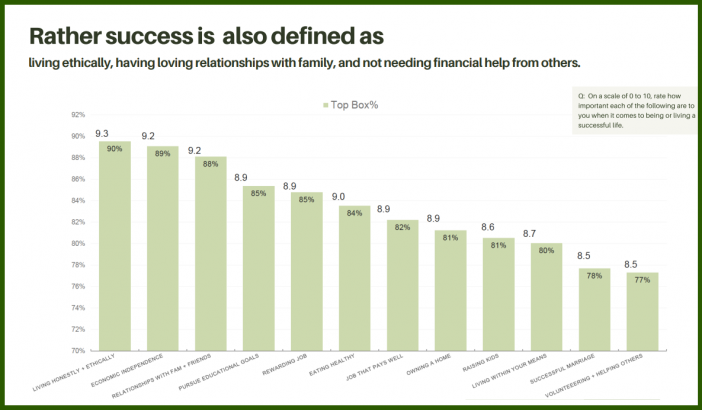
An overwhelming majority of Black women define success in ways that affect their quality of life beyond financial means. Eighty-five percent say that pursuing educational goals is one key way they look at success.
Educational opportunity and attainment is more important to Black womens’ perceived success than a high-paying job (82 percent), owning a home or raising kids (81 percent).
For Wyatt, these findings are another indicator that leaders must look to education policy to ameliorate racial inequities, particularly as more data is released from pandemic-era learning.
“We know that opportunity gaps are widening and we know that students are learning at different rates,” said Wyatt, “and for me that means that we differentiated solutions that are rooted deeply in community voice, deeply in evidence and deeply with equity and justice as our Northstar.”
Other notable findings
- 83 percent say college needs to be made more affordable
- 88 percent say they will likely vote during midterm elections
- 78 percent say quality day care needs to be made more affordable
Get stories like these delivered straight to your inbox. Sign up for The 74 Newsletter

;)
